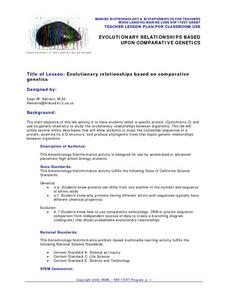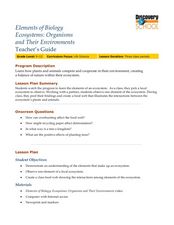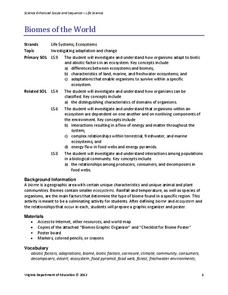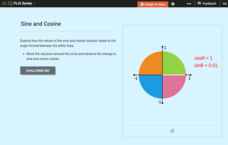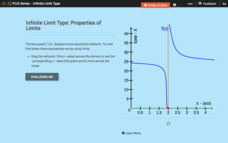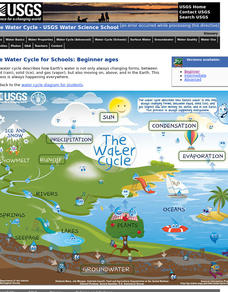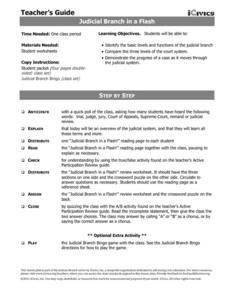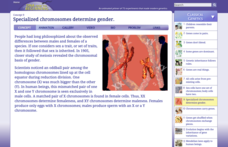Curated OER
Evolutionary Relationships Based Upon Comparative Genetics
Students investigate the protein cytochrome c in an attempt to use its genetic chemistry to study possible evolutionary relationships between organisms. The lesson integrates technology with the use computers to perform DNA analysis.
Curated OER
Genome Interactions
In this genome interactions worksheet, students read the passage about genome interactions then apply the knowledge to answer several short answer questions.
Curated OER
Organisms and Their Environments
Students study a local ecosystem and research the organisms to create a food web. In this ecosystem lesson, students view a video and answer questions. They visit a local ecosystem and make a list of organisms to research. Students...
Howard Hughes Medical Institute
Niche Partitioning Activity
Dinnertime on the African savanna is a highly choreographed event! Introduce young ecologists to the concept of niche partitioning through a hands-on activity. Pupils research animal behaviors and use data to develop an understanding of...
Curated OER
Exposure!
Students investigate that chemicals may affect different people in different ways. They also realize that their perceptions of dangerous materials may not be realistic and that the news media may not provide all the information needed to...
Curated OER
Studying The Catcher in the Rye
What's the difference between being a phony and being a conformist? At what point does conforming to alleviate loneliness lead to insincerity? These are the questions at the heart of this unit plan that uses The Catcher in the Rye as an...
Cornell University
Classification
Explore the scientific method of classification. An interactive activity asks learners to create a classification system for a group of objects and develop a flow chart to communicate their systems. In addition, individuals use a...
Curated OER
Oysters Are Habit Forming!
Students examine the relationships within a salt marsh habitat. In this habitat lesson, students examine the various kinds of symbiotic relationships in a salt marsh habitat.
American Museum of Natural History
Dive Into Worlds Within the Sea
Make connections between ocean organisms. Individuals explore three different ecosystems in the ocean. With an online interactive, they learn how different organisms depend upon each other. Learners first answer questions to connect...
Virginia Department of Education
Biomes of the World
Incorporate knowledge about biomes and ecosystems in multiple ways while encouraging creativity. Emerging ecologists collaborate and perform research to complete a graphic organizer about various biomes of the world. They conclude the...
University of Minnesota
Virtual Neurons
It's electric! Young anatomists use Virtual Neurons software to build, control, and analyze complex nerve circuits within the body. Colorful and packed with content, class members enjoy interacting with the nervous system at a personal...
CK-12 Foundation
Radian Measure: Unit Circle Conversions
Individuals investigate the relationship between radian and angle measurements by using an interactive to find the angle measurement for given radian measures. Users answer questions to convert between the two measurements.
iCivics
So You Think You Can Argue
What defines an argument, and how can someone properly formulate a counterargument? This resource provides two options—an interactive PowerPoint presentation or worksheet—that will support your learners as they begin to explore how to...
iCivics
We the Jury
Learners take on the roles of jurors in a civil case to evaluate evidence and determine a verdict in this engaging online interactive experience.
Curated OER
Cell City Project - You are the Designer!
How can something as large as a city and as small as a cell have anything in common? That is exactly the question young scientists explore with this engaging life science project. Choosing to focus on a city, school, factory, or other...
CK-12 Foundation
Domain, Range, and Signs of Trigonometric Functions: Sine and Cosine
Is there a relationship between the sign of sine and cosine and the angle on the unit circle? Scholars use an interactive to see the value of sine and cosine within different quadrants. they then use the information to determine the...
CK-12 Foundation
Infinite Limit Type: Properties of Limits
Limits can provide some valuable information about graphs. A slider interactive lets learners see the behavior of a graph around asymptotes. They investigate relationships between limits and asymptotes.
American Museum of Natural History
The Tree of Life
Groups of species can have more in common than meets the eye. An interactive cladogram shows some of the connections between important groups of species. Learners click on sections of the diagram to learn more about the connections or on...
American Museum of Natural History
What's the Big Deal About Water?
It may seem simple, but water is one of the most unique substances on Earth. An interactive online lesson describes its properties and importance in so many different situations. Learners interact with the lesson to learn the role water...
University of North Carolina
Sociology
What exactly does sociology entail? Sociology is a broad field that covers many topics, including culture, mass media, and social movements. A helpful handout prepares scholars for typical writing found in college-level sociology...
US Geological Survey
The Water Cycle for Schools: Beginner Ages
Explore a day in the life of a water droplet. An interactive infographic helps scholars learn how water cycles work from precipitation all the way around to condensation. Learners hover over each step of the cycle to read more as they...
National Park Service
The Water Cycle Game
Take young scientists on a trip through the water cycle with this interactive science activity. After setting up a series of ten stations representing the different places water can be found, children use the included printable dice to...
iCivics
Judicial Branch in a Flash
What is the difference between the federal court and state court systems? What about criminal versus civil cases? Check out this resource that will offer your class members a general and effective overview of the judicial branch in the...
Cold Spring Harbor Laboratory
Specialized Chromosomes Determine Gender
Are you an XX or an XY? Budding scientists learn about cellular fertilization and the determination of gender in a thorough online lesson. They follow their study with a set of interactive reflection questions.


